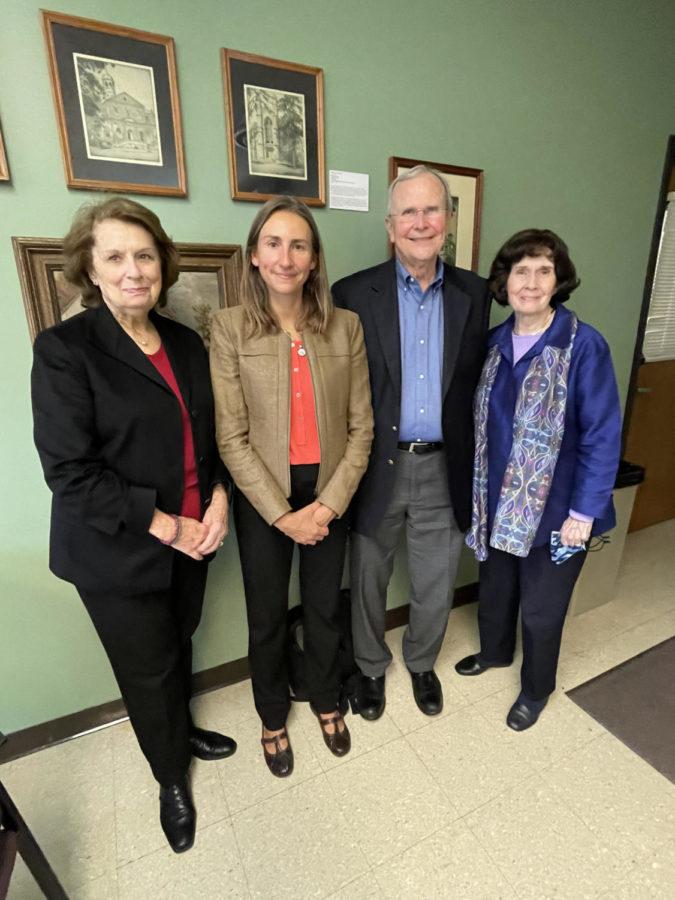Rossmann Manatt Award recipient launches Bee and Wasp Squad
(From left to right) Kathleen Manatt, Amy Toth, Jack Rossmann and Marty Rossmann after the presentation.
October 28, 2021
Recent award recipient and Professor of Ecology, Evolution and Organismal Biology, Amy Toth, gave a presentation Thursday on the recent research and programming conducted on pollinators’ health and nutrition.
The recent research and educational program were all made possible through the Rossmann Manatt Faculty Development Award, which presents the recipient a one-time award of approximately $5,000-$10,000. Over last summer, Toth used the award to initiate the Bee and Wasp Squad, which enabled a select few students, along with an advisor, to engage in their own research projects.
Bee and Wasp Squad’s studies included honey bee’s traveling habits, the paper wasp’s effectiveness in pollination, the forces behind paper wasp’s aggression and more. The data drawn from their research is used throughout the presentation and helped to identify solutions for the current pollinator health crisis.
Toth’s presentation took place in a small conference room inside Heady Hall, populated mostly by fellow faculty members from Iowa State, a few grad students, and the Rossmann and Manatt families.
Toth outlined the importance of pollinators, such as bees, butterflies and even wasps, in the production of crops and many wild species of plants. Toth explained the dire circumstances many of these species face as their environment is replaced by cities and monoculture environments like crop fields.
In 2018-2019, Iowan apiarists saw a 67 percent loss of colonies through the winter, this percentage is more than four times what would be considered “sustainable loss.” Toth’s presentation focused on factors that are negatively affecting the health of pollinators, primarily honey bees. Toth highlighted the nutrition of honey bees as a big factor in their survival through winter.
According to the presentation, the honey bee diet is deceptively simple and subtly complex. The honey bee eats pollen and nectar, both of which are found in abundance in Iowa for portions of the year. Unfortunately for honey bees in Iowa, the pollen provided by corn is of little nutritional value, and the nectar provided by soybeans is only available for a short period of time. With these crops making up much of the land in Iowa, honey bees are left with few options to acquire enough honey and fat to last them through the winter.
According to Toth’s research, honey bees and presumably other pollinators, are best supported by a diet including nectars and pollens from a wide variety of plant species. Iowa’s primarily monoculture environments limit the honey bee’s ability to stock up on enough nutrients to survive the winter.
Toth highlighted a current project at Iowa State that could offer a real-world solution to helping pollinators acquire proper nutrition. Iowa State’s STRIPS project is starting the practice of dividing roughly 10 percent of crop fields into strips of prairie grasses and plants. This practice can help to improve soil quality and decrease erosion in fields. As Toth explained in her presentation, these prairie strips would offer honey bees a diverse source of pollens and nectars to help support their diet.
After the presentation, Jack and Marty Rossmann, some of the donors behind the Rossmann Manatt Faculty Award, expressed their appreciation of the work being done by Toth and the Bee and Wasp Squad.
“Well, we’re so delighted, she’s doing wonderful research.” said Jack. “And I think the use of the faculty development funds is going exactly the way we hoped it would or is a marvelous example of what we hope this program would be.”
“To use those funds for mentoring students and giving students an opportunity to do something that they might eventually pursue a career in, it’s marvelous,” chimed in Marty.
Toth explained her hopes for the future of the Bee and Wasp Squad as the program attempts to make it off the ground. While the Rossmann Manatt Faculty Development Award funded this first summer, future years are up in the air until funding can be secured.
“We have always had undergrads in the lab to be clear… But what we haven’t had is a mechanism to make it more of a long-term relationship with the student,” Toth said. “Like a program that [enables us] to pay them well, so we can attract the best students.”
According to Toth, asking students to volunteer their time and effort leads to many of the highest quality students taking paid internships and other programs. Receiving the award enabled Toth to jump-start the Bee and Wasp Squad, but more funding would be important to continue sponsoring quality cohorts of students conducting their own research.
















